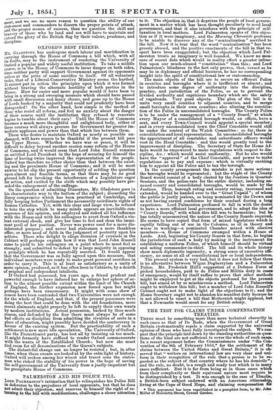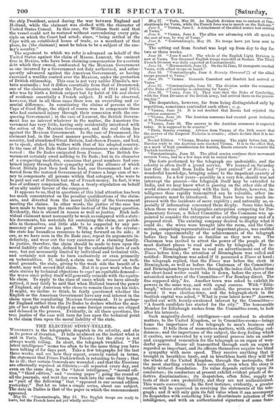THE TEST FOR CLAIMS UNDER COMPENSATION TREATIES.
TO.ERE must be something more than mere technical obscurity in such eases as that of De Bode, when the Government of Great Britain systematically repels a claim supported by the universal opinion of those who have fully investigated the subject. We sus- pect that the principle laid down by the standing authorities on ques- tions of the kind are not sufficient to cover the whole of such cases. In a recent argument before the Commissioners under "the Con- vention of the 8th of February 1853," for the settlement of the claims between the United States and Great Britain," it is ob- served that "writers on international law are very clear and uni- form in their recognition of the rule that a person is to be re- garded as the subject of that country where he has his domicile"; and the rule, no doubt, is a rough and ready test which is in eases sufficient But it is far from being so in those eases Sn:a from their complexity or their equivocal nature most require to be distinguished by a test. It was enough in the case of Elmslie, a British-born subject endowed with an American citizenship, living at the Cape of Good Hope, and claiming compensation for * This argument has been republished in a pamphlet form, by Mr. John Miner of Henrietta Street, Covent Garden.
the ship President, seized during the war between England and Holland, while the claimant was clothed with the character of United States Consul. In this case, Sir William Scott said that the vessel could not be restored without surrendering every prin- ciple on which the Court had acted; since, "being settled at the Cape with an established house of trade, as a merchant of that place, he [the claimant] must be taken to be a subject of the ene- my's country."
The argument to which we refer is advanced on behalf of the United States against the claim of Messrs. Laurent, the eminent firm in Mexico, who have been claiming compensation for a certain debt which they owned, confiscated by the Mexican Government as one incurred by a Government not duly authorized, and subse- quently advanced against the American Government, as having exercised a warlike control over the Mexican, under the protection of British citizenship. This case is not very unlike Elmslie's, mu- tatis mutandis ; but it differs essentially from that of Drummond, one of the claimants under the Paris treaties of 1814 and 1815, who was by birth a British subject but by habit of life and choice of residence essentially a French subject. It will be observed, however, that in all these cases there was an overruling and es- sential difference. In considering the claims of persons at the Cape of Good Hope, the object of course was to compensate those who had sustained injury through their connexion with the con- quering Government ; in the case of Laurent, the British Govern- ment has no interest whatever in the matter, the American Go- vernment has very little, having only accidentally interfered with the action of the Mexican Government, and the real claim lies against the Mexican Government. In the case of Drummond, the claimant had, in the freest manner possible, made choice of his country, had abandoned Great Britain, had chosen France, and had, so to speak, staked his welfare with that of his adopted country. In the ease of De Bode these latter circumstances were almost re- versed : the De Bodes emigrated from France. The British Go- vernment certainly owed nothing to De Bode ; but in its character of a conquering mediator, conscious that great numbers had sus- tained injury through their sympathy with the alliance of which Great Britain just then took the lead, our Government had ex- torte4 from the restored Government of France a large sum of mo- ney to compensate all persons within that category, who were to be paid not out of British but out of French money. In fact, it was less of ordinary compensation, than a treaty-stipulation on behalf of an ally under favour of the conqueror. It appears to us, that in questions of this kind attention has been too much concentrated on the peculiar qualifications of the claim- ants, and diverted from the moral liability of the Government meeting the claims. In other words, the justice of the case has been made to turn upon the smaller instead of the larger question. Evidently, this is absurd in reason as well as justice. Each indi- vidual claimant must necessarily be weak as compared with a state : his documents, his materials for sustaining the claim, are perish- able in themselves, and little able to be supported by any per- manency of power on his part. With a state it is the reverse : the state has boundless resources to bring forward on its side ; it can, as we have seen in the De Bode case, repeat its arguments in- definitely, and wear out the very existence of a claiming family. In justice, therefore, the claim should be made to turn upon the moral liability of the state, defined by the substantial facts of each case, but not necessarily limited by individual and technical title, and certainly not made to turn exclusively or even primarily on technicalities. If, indeed, a claim can be advanced on tech- nical grounds, the state, giving to the weak side the benefit of a doubt, may well accord that claim. But it is poor work when the state strives by technical objections to repel an equitable demand— the worse since policy itself will generally coincide with the equita- ble claim. To apply to the class of cases which we have already noticed, it may fairly be said that when Holland braved the power of England, any American who chose to remain there ran his risks. It might, we incline to think, be fairly questioned whether the English or the American Government have any real interest in the claim upon the repudiating Mexican Government. It is perhapg for England rather than the De Bodes to declare whether the mar- gin of her regis shall be clipped as some foreign crowns are clipped and debased in the process. Evidently, in all these questions, the true justice of the case will turn far less upon the technical point in the claim than upon the moral liability of the state.



































 Previous page
Previous page